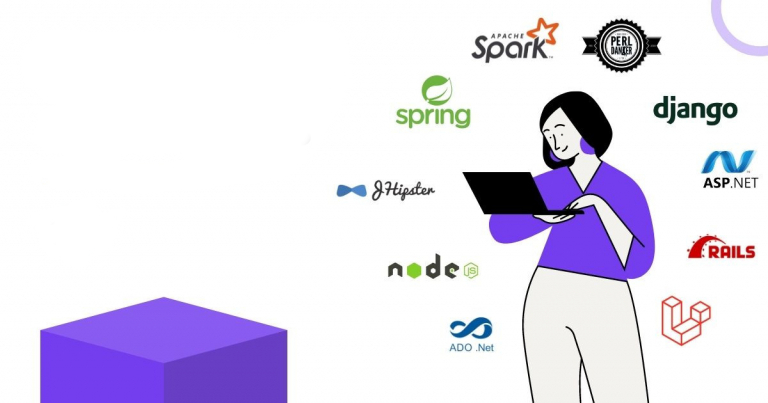Most Popular Backend Frameworks
5 Dominant Server-side Frameworks in the Market

A web framework is a software framework that is designed to support the development of web applications including web services and web APIs. Web frameworks provide a standard way to build and deploy web applications on the Internet. Web frameworks aim to automate the overhead associated with common activities performed in web development. There are two aspects in web development: Front-end of Client-side Development and Back-end or Server-side Development. Here are the 6 dominant server-side frameworks in the market.
-
Laravel
Laravel is one of the Most Popular Backend Frameworks for web application development following the Model-View-Controller (MVC) architectural pattern. It has a modular packaging system with a rich set of features and benefits making it a preferred choice for global players like Asana, Alibaba, and 9GAG.
This PHP-based web framework supports an elegant and expressive syntax enabling developers to write clean and readable code. The wide range of built-in functions and expressive syntax work as a "Laravel Magic" in streamlining routing, database queries, and authentication with greater focus on simplicity, elegance, and readability.
What's more? Laravel has the Model-View-Controller (MVC) architectural pattern, enabling developers to separate the application logic into different components, and an Object-Relational Mapping (ORM) called Eloquent, which defines database models as simple PHP classes and encourages seamless interaction with databases.
-
Django
Django is a high-level Python Web Framework for backend development that encourages rapid Django Development and pragmatic design. It follows the Model-View-Controller (MVC) architectural pattern and ensures the seamless development of web applications with minimal boilerplate code. Django comes with Object-Relational Mapping (ORM) which enables backend developers to add, delete, modify and query objects using a default admin interface.
Django provides full support for various databases like PostgreSQL, MySQL, SQLite, and Oracle, making it easier for developers to switch between different databases. Django offers many built-in security features such as protection against cross-site scripting (XSS), cross-site request forgery (CSRF), SQL injection, and clickjacking that make it a preferred choice for developing secure web applications, even for giants like Instagram, Pinterest, and Mozilla.
-
ASP.NET
ASP.NET Core, developed by Microsoft, serves as a framework, for.NET application development. It stands out as a next-generation Backend Framework that replaces its predecessor, ASP.NET which was limited to the Windows platform. What sets ASP.NET Core apart is its platform compatibility with Windows, Linux and macOS since it is an open source framework. With a range of core features, it has become a leading web framework in the industry.
One of the standout features of ASP.NET Core is its data collection capability that enhances performance. It also excels in configuring environments tailored to cloud computing needs ensuring integration with cloud based platforms. The framework's HTTP request pipeline is designed to be modular and lightweight enabling processing of requests. A major advantage of ASP.NET Core lies in its focus on performance surpassing competing web frameworks like Node.js. Moreover, it supports side-by-side versioning allowing applications running versions of ASP.NET Core to coexist on the same server.
-
Express.js
Express.js is a lightweight, flexible, and minimalistic Node.js web application framework comes with a robust set of features to develop server-side applications and RESTful APIs (Representational State Transfer).
As one of the Most Popular Backend Frameworks, it has flexibility to easily add third-party modules and plugins to the web application for enhanced functionality. Express.js ecosystem supports integration of middleware, templating engines, authentication modules, and other plugins into an Express.js application.
The built-in error handling mechanisms, route handling, request and response handling, and middleware support, make Express.js a popular choice for developers. Also, this framework makes custom error handling during the request processing much hassle-free across the application.
-
Springboot
Spring is an open-source application framework and inversion of a control container for the Java platform. It is much appreciated for developing enterprise-level Java applications because of its modularity, dependency injection, aspect-oriented programming, robustness, extensibility, and easy integration with other frameworks.
It is a preferred choice for developing enterprise-grade web applications as Spring Framework Supports the IoC principle, which handles end-to-end dependencies between different components in a flexible way. Spring, as a lightweight and modular platform, encourages application modularization and makes configuration flexible through XML, Java annotations, or Java-based configuration.
Spring helps in developing cleaner and more modular code by using Aspect-Oriented Programming (AOP), which allows backend developers to conveniently separate cross-cutting challenges, including logging, security, and transaction management, from the core business logic, making it easier to maintain the code quality.
